Hiring Millennials: A Balancing Act
By Wendy Mantel, certified social media strategist and president, Mantel Coaching, Inc.
 The millennial generation (Generation Y, ages 19-39) has been stereotyped as narcissistic, selfie-obsessed, self-promoters. But they are the largest, most diverse demographic cohort in American history, and their potential to make myriad unimagined strides in our country’s progress can’t be understated.
The millennial generation (Generation Y, ages 19-39) has been stereotyped as narcissistic, selfie-obsessed, self-promoters. But they are the largest, most diverse demographic cohort in American history, and their potential to make myriad unimagined strides in our country’s progress can’t be understated.
There are those who argue that millennials aren’t narcissistic at all; they’re individualistic. They want to make their mark at work and view work as a key part of life, not something to be “balanced with life.” They want to be recognized for a job well done. They’re in a hurry for success, but not to the exclusion of feedback and guidance.
How, then, does a company mentor these hungry, driven, young leaders?
The business literature suggests that millennials need opportunities to balance self-discovery and personal fulfillment with a sense of higher purpose. They want close, meaningful relationships with mentors — in and outside of work. But they need to feel empowered to use their individualism — to be authentic, to discover, and to become their own brands. Engagement, learning, growth, visibility, relevance, integrity, and opportunity are watchwords for this generation.
Charismatic executives who lead a cult-like following won’t cut it with millennials. Neither will cultures where power is misaligned, and there is manipulation, misuse, or no use of talent — a recipe for employee disillusionment in any case. And traditional one-on-one mentoring programs won’t do it either.
Social impact and communications strategist Erica Williams Simon puts it this way:
"The reality is, when you look at young people, all the data shows that young people are civic-minded in a very different way … They are not as interested in politics, but are interested in social change and finding creative, innovative ways to make a difference that are in a way more effective than the systems of the past."
According to a survey by Virtuali in November 2014, millennials see mentoring as the most effective and desirable form of career development training. That’s the good news.
However, unlike earlier generations, millennials want faster, more effective mentoring. Faster and more effective means fulfilling the millennial’s high goals by preparing him or her to rise and reach the executive ranks more quickly. This requires, in some companies, thoroughly rethinking the established mentoring approach.
In some cases, rotational programs are being created to enable employees to circulate through pivotal departments over a year or longer. The mentee works with a series of executive mentors, creating, in effect, a personal board of advisors. This benefits the company too, establishing a panel of seasoned managers who can observe these employees firsthand and spot high-potentials early on.
In other cases, mentees tap into internal and external mentoring resources, such as the Healthcare Businesswomen’s Association group mentoring program.
What’s really different about the millennial generation is that it isn’t waiting around for the dream to come true. If the dream doesn’t materialize at one company, they’ll find it at another, and they won’t wait long for the signals. Progressive companies that recognize the fine balance between drive and development will create mentoring programs that support individual development and advancement, while positioning the company to reap the benefits of its future leadership.
